We will be posting the outcomes of the projects from 2021-22 on this page.
If you have questions please get in contact via changemakers@ucl.ac.uk
We will be posting the outcomes of the projects from 2021-22 on this page.
If you have questions please get in contact via changemakers@ucl.ac.uk
THE TEAM
Student leads: Boya Zhang, Shawn Lee, Dan Kviat
Staff lead: Jacob Wright
DEPARTMENT
Cancer Institute
WHAT HAPPENED?
Our project aims to increase global awareness in the IMS Undergraduate Curriculum. The current curriculum primarily focuses on a more eurocentric context, limiting global exposure. However, especially in an increasingly globalised society and a vastly diverse student population, global awareness has become increasingly more important, for future careers or better representation of the diverse student population. As we aim to find ways to introduce more global perspectives into the curriculum, we have conducted a survey with both students and faculty members, to understand their perspectives and establish whether there is the need to increase global awareness. This is followed by a short interview with a few students and faculty members, to have them elaborate on their survey questions and for us to further understand their perspectives of globalisation (i.e. what it might be and how it might be challenging to incorporate more into the curriculum). We managed to gain insightful comments from both faculty members and students. The team will then gather and analyse all of the data, before designing a framework that can help faculty members/module leads, as a reference when they are designing the curriculum.
WHAT ADVICE OR ENCOURAGEMENT WOULD YOU GIVE TO SOMEONE THINKING OF DOING A CHANGEMAKERS PROJECT?
I would advise that they start earlier, as it will be hard to manage the project on top of school lectures and projects etc. I would also suggest that students/staff should do a ChangeMakers project on something they are really passionate about or have an immense of interest in.
THE TEAM
Lead: Mara Torres Pinedo
Support students: Amanda Kartikasari, Hemant Kumar, Ismat Juma, Kenneth Franco, Maria Jose Ascenzo
DEPARTMENT
Institute for Global Prosperity
WHAT HAPPENED?
The Dissertation Workshop co-developed with students a collaborative learning community to support and provide a sense of belonging for IGP MSc students during their dissertation period while reflecting on the overall learning process to improve research skills and collaborative learning for future cohorts. This project engages well with the ethos of the Institute for Global Prosperity and its commitment to transdisciplinary approaches to create more prosperous futures for all. Bringing innovation and dialogue spaces to explore models of future teaching practices that improve the belonging and wellbeing of our community can open the door to an authentic transformative education.
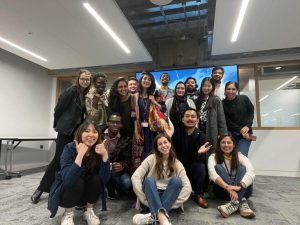
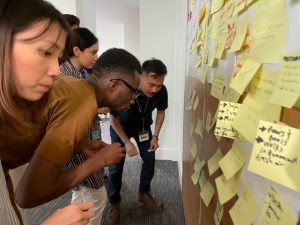
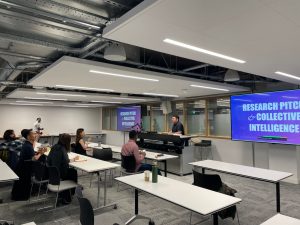
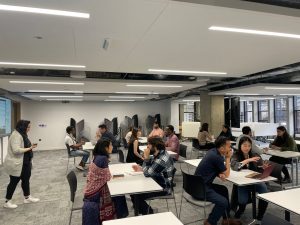
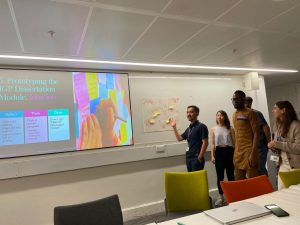
THE TEAM
Staff: Isobel Mackay, Beth Hills, Seema Walker (and support from Katie Bretherick our student advisor)
Lead Students: Yi Hui Loh, Adam Izham
Support Students; Lance Simanjoentak, Rebekah Goldwag
DEPARTMENT
Chemical Engineering
WHAT HAPPENED?
In recent years the Department of Chemical Engineering has received large numbers of Extenuating Circumstances claims with students referring to poor mental health and wellbeing. Issues with students’ mental health were also raised in the ASER. When discussed in the SSCC student reps mentioned that they are comfortable discussing academic matters with personal tutors, but not anything regarding mental health. In response to this the department have put in a variety of extra provisions, including training several staff members as Mental Health First Aiders and offering wellbeing drop-in sessions with these staff members as well as directly with the departmental tutors. These drop-in sessions are very rarely attended by students so it is clear that this type of provision is also not one that the students are comfortable using, and we want to use this project to determine how we can help students more effectively. In order to improve the mental health and wellbeing of students in the department of Chemical Engineering it was decided to run a Change Makers project to explore how best we can provide pastoral care to our students, in ways that the students will find the most effective and valuable. There were two key sections to this project. Firstly, for the student partners to design and run a series of focus groups to canvas the opinions of their peers on the wellbeing provision already in place in the department, and what other provisions they would benefit from. Secondly, the staff and students on the project to get together and analyse the anonymised responses of the focus groups to create a series of recommendations for the department. These recommendations will be presented to the Departmental leadership team and where appropriate acted on and implemented in future academic years, led by the departmental tutor.
2022_CE_Mental_Health_Change_Makers_Report_Isobel Mackay
WHAT ADVICE OR ENCOURAGEMENT WOULD YOU GIVE TO SOMEONE THINKING OF DOING A CHANGEMAKERS PROJECT?
This is a really great scheme and excellent way to get students involved with decision making at a higher level in their department. Students were really excited about being asked to be involved with this project to be able to influence their future, but also as it showed the department cares about their voice.
THE TEAM
Staff leads: Dr Rana Khalife, Dr Chika Nweke
Student lead: Pierre Springuel
DEPARTMENT
Biochemical Engineering
WHAT HAPPENED?
Research has shown that the potential skills gap in engineering, exacerbated by the pandemic, has started to show when graduates go out into engineering industries (Hou 2020). Final year students in the department have also expressed worries via personal tutoring sessions about how the gap in lab skills will impact their employability and this has also been discussed in staff meetings, together with resulting increased burden on careers support from the departmental careers liaison officer and the UCL Engineering Careers team. It is holistically believed that the outcome of this project should not only help current and former students but can also help to alleviate some of the pressures on staff and industry. In understanding the impact of Labster, a number of stakeholders will benefit. If proved successful, the tool can be applied to other modules in the department with minimal staff training, meaning that academic and teaching staff can use it to train UG, PGT and PGR students. The tool can also be used in the training of industrial delegates who receive training from our department via MBIs (Modular Training for the Bioprocess Industries). The results of this study may also highlight some limitations of the tool, which can be fed back to the company that designed Labster, who the UCL Digital Education team have built a relationship with.
WHAT ADVICE OR ENCOURAGEMENT WOULD YOU GIVE TO SOMEONE THINKING OF DOING A CHANGEMAKERS PROJECT?
Have a good timetable for the project, make sure you would be able to give the survey/do workshop before term end. Even ask the students for feedback on the project.
THE TEAM
WHAT ADVICE OR ENCOURAGEMENT WOULD YOU GIVE TO SOMEONE THINKING OF DOING A CHANGEMAKERS PROJECT?
THE TEAM
Kamille Beye
Stella Cheong
Rowena Palicious
Adam Peter Lang
DEPARTMENT
Curriculum, Pedagogy and Assessment, IOE
WHAT HAPPENED?
Conversations4Citizenship is an innovative, inclusive, international podcast capturing discussions and debates on a wide range of citizenship issues focusing on emergence from the COVID 19 pandemic. Re -imagining citizenship education for a better future in these troubling geo-political times. We look at topics large or small and try to tell stories that appeal to a wide range of students, academics and practitioners.
WHAT ADVICE OR ENCOURAGEMENT WOULD YOU GIVE TO SOMEONE THINKING OF DOING A CHANGEMAKERS PROJECT?
THE TEAM
Staff lead: Joanna Faure Walker
Student leads: Rebekah Yore, Candice Oreal
DEPARTMENT
Institute for Risk and Disaster Reduction
WHAT HAPPENED?
We worked together as a team to design and co-create the beginnings of a podcast around disaster themes that could be run in the future as an Institute for Risk and Disaster Reduction podcast. The project included considering how series and episodes could be structured and what topics could be covered. We recorded a pilot episode, including two members of the team, and then a focus group was led by the other team member among current students for feedback about structure, style and content, as well as being used as an opportunity to receive further ideas. Following from the feedback (which was useful and much appreciated), we then proceeded to make some minor amendments to the pilot and record further episodes. We now have a few episodes ready and a plan for the details of the rest of the first season, as well as some exciting ideas for following seasons. Having a staff, PhD student, and masters student work together allowed us to think carefully about different audiences and aims, and to recognise strengths across the team. I hope to have many opportunities to work with the whole team again.
WHAT ADVICE OR ENCOURAGEMENT WOULD YOU GIVE TO SOMEONE THINKING OF DOING A CHANGEMAKERS PROJECT?
Ensure to have a conversation at the beginning about why everyone is participating and what they would like to get out of it. We did this in the first meeting and allowed us to tailor activities and assign tasks in a way to help different team members get the experience in the areas wanted and help them develop the desired skills. Do be realistic about how much can be achieved in the time – it can be tempting to be overly ambitious. Think about what the legacy of the project will be and how to ensure that occurs.
THE TEAM
Lead students: Trista Wu, Chanju Mwanza, Michelle Kai Yee Wong, Wai Lok Ng
Support students: Kazunori Shishikura, Fu Kexin
Staff lead: Ieva Kelpsaite
DEPARTMENT
Student Services Team (IOE)
WHAT HAPPENED?
In this project lead students led three creative groups – podcast, website creation and video creation. The website and podcast groups have been incredibly successful as they have most participating students engaging with the project, following up the workshop and learning to either design their own website or create a podcast. We had participating students showcasing their work at the end of the year celebration. I found particularly inspiring that our student leaders needed very little support from the staff to lead their own groups and workshops. They were switched on and knew how to manage the groups, and how to engage. I thought that their leadership were exemplary and I hope something they will take away into the workplace as a great skill they’ve practiced.
WHAT ADVICE OR ENCOURAGEMENT WOULD YOU GIVE TO SOMEONE THINKING OF DOING A CHANGEMAKERS PROJECT?
Go for it, it’s currently the most successful way of engaging with the students. As it’s a long time engagement it also leaves greatest impact on the students.
THE TEAM
WHAT ADVICE OR ENCOURAGEMENT WOULD YOU GIVE TO SOMEONE THINKING OF DOING A CHANGEMAKERS PROJECT?
The staff-student collaboration was the highlight of this project, and I would recommend the ChangeMakers scheme for this opportunity.
THE TEAM
WHAT ADVICE OR ENCOURAGEMENT WOULD YOU GIVE TO SOMEONE THINKING OF DOING A CHANGEMAKERS PROJECT?